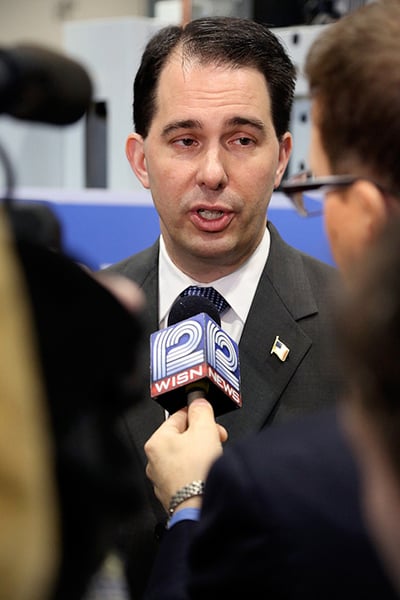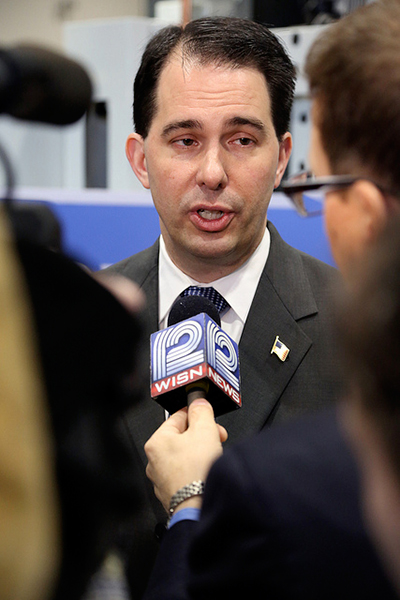 The Center for Media and Democracy has detailed the bipartisan state investigation into the Scott Walker campaign and the secretive big money groups that bankrolled his 2012 recall victory. (Photo: Gateway Technical College)Do you want media that’s accountable to YOU, not to corporate sponsors? Help publish journalism with real integrity and independence – donate to Truthout!
The Center for Media and Democracy has detailed the bipartisan state investigation into the Scott Walker campaign and the secretive big money groups that bankrolled his 2012 recall victory. (Photo: Gateway Technical College)Do you want media that’s accountable to YOU, not to corporate sponsors? Help publish journalism with real integrity and independence – donate to Truthout!
Two court cases this week – one being heard in open court, another being considered in silence behind closed doors – will decide the future of Wisconsin campaign finance law, the independence of the Wisconsin judiciary and will impact the future of presidential candidate Scott Walker.
The stakes could not be higher, but the converging cases have garnered little national attention.
Walker Criminal Probe to Be “Heard” in Silence
The Wisconsin Supreme Court is slated to take up the “John Doe” criminal investigation of alleged coordination between Friends of Scott Walker and “independent” groups during the tumultuous 2011-2012 recall elections.
The Center for Media and Democracy (CMD) has detailed the bipartisan state investigation into the Walker campaign and the secretive big money groups that bankrolled his 2012 recall victory. Wisconsin Club for Growth (WiCFG), headed by Walker campaign manager R.J. Johnson and the “third Koch Brother” Eric O’Keefe, spent at least $9.1 million on Wisconsin’s unprecedented recall elections, and funneled almost $10 million more to other politically-active groups, including Wisconsin Manufacturers and Commerce. Yet, WiCFG, which enjoys tax free status, told the IRS that it spent $0 in political activity during that period.
Prosecutors allege that Walker secretly raised millions for WiCFG from out-of-state donors like Donald Trump and Paul Singer, and allegedly coordinated with WiCFG in order to evade Wisconsin’s donor disclosure laws. Talking points prepared for the governor advised him to “stress that donations to WiCFG are not disclosed,” and to tell donors “that you can accept corporate contributions and it is not reported.”
These dark money schemes left voters completely in the dark about who was truly influencing elections in the state, CMD argued in the Milwaukee Journal Sentinel. Wisconsinites never knew that a Florida-based mining company lobbying for a massive open pit mine in Wisconsin secretly gave $700,000 to WiCFG, nor did they know that John Menard gave $1.5 million to the group, and in turn received at least $1.8 million in tax credits from Walker’s job development agency.
The investigation has been halted by a passel of lawyers hired by the groups under investigation and its fate now rests with the Wisconsin’s Supreme Court.
In an unprecedented move, the court’s right-wing majority decided not to hear oral arguments, in order to protect the defendants against leaks, over the strong objections of the Chief Justice.
While WiCFG leader Eric O’Keefe is constantly howling “partisan witch hunt” to the Wall Street Journal and even likened the investigation to being raped, the fact is that the chief prosecutor is the case is Francis Schmitz, a well-respected Republican anti-terrorism prosecutor who received the “US Attorney General’s Award for Distinguished Service” from Michael Mukasey’s Justice Department in 2007. Schmitz even admitted to voting for Walker in the recall election.
Schmitz and his team took note that four of the right-wing justices were elected to office with huge expenditures by the very big money groups under investigation. He has demanded that these justices recuse themselves from the case, but the request has been ignored.
In “hearing” the John Doe, the Wisconsin Supreme Court will consider not only the future of the investigation and the fate of Walker, but also the future of Wisconsin campaign finance law, and whether candidates (including the justices themselves, when they are up for reelection) will be able to coordinate with dark money groups whose job it is raise and spend unlimited dollars from powerful special interests.
Wisconsin’s Common Cause director Jay Heck explained: “What is at stake here is the independence of the Wisconsin judiciary. The Wisconsin Supreme Court was once considered the model for the nation in terms of its impartiality and independence. That history could be wiped out by a single decision by this court to open up the doors to coordination with outside groups and effectively render campaign contribution limits meaningless.”
Walker and Dark Money Allies Orchestrate Coup of the Courts
In a related case, Walker’s big money allies are busily engineering a coup of the courts to strip the independent Chief Justice, Shirley Abrahamson, of her title and authority.
Wisconsin elects Supreme Court Justices for 10 year terms. For 126 years under the Wisconsin’s Constitution, the title of Chief Justice has been given to the longest serving member, but sticking to that plan would leave critical thinkers in charge for decades to come. Abrahamson was reelected as Chief to a 10 year term in 2009 with 60% of the vote. After Abrahamson, Justice Anne Walsh Bradley, who has fought to keep partisan politics out of the courts, would be next in line.
As CMD previously reported the threat of having a Chief who was not under their thumb was simply too much for Team Walker and his dark money allies. The GOP controlled legislature urged on by WMC and the Koch-funded Americans for Prosperity backed a constitutional change to strip the Chief of her title and authority and rushed to get it on the low-turn out spring ballot.
As veteran Milwaukee journalist Bruce Murphy put it: “Proponents of the measure have said it’s about displacing seniority with democracy, but declined to make it effective in 2019, when Abrahamson’s term ends, leaving no doubt this was a get-Shirley amendment.” And let’s not forget the unseemly, undisclosed lobbying by other justices hoping to be Chief, including Pat “Patience” Roggensack.
To orchestrate a constitutional coup a phony “vote yes” group was formed by Rogensack’s former campaign manager and WMC piled on the cash in a $600,000 ad blitz saying it was all about “democracy.” In the final weekend before election day, the liberal Greater Milwaukee Committee fielded an extra $200,000 in ads, but it was too late to make a difference.
Perhaps if the WMC ads had explained that they were unseating the chief and purchasing the best court money could buy, the result may have been different. But it was no surprise when, as the Capital Times explained: “They secured a narrow 53 percent to 47 percent victory in a low-turnout election; barely 10 percent of Wisconsin’s voting-age population supported the deliberately confusing amendment.” Court observers tracking the “We Hate Shirley” amendment assumed that she would soon lose her title and her authority.
But the feisty 81-year old Chief Justice is not taking the dark money onslaught lying down. She filed a federal lawsuit (documents here) brought by one of the nation’s most respected constitutional lawyers, Robert Peck of the Center for Constitutional Litigation, arguing that changing the rules concerning how a Chief is selected in the middle of her term violates the Equal Protection and Due Process rights of the chief herself and the voters who elected her under the US Constitution.
While WMC lobbyists and right-wing politicians are fuming at this audacious move, respected constitutional scholar David Schwartz, Professor of Law at the University of Wisconsin had a different view.
Chief Judge Abrahamson’s decision to file a suit in federal court is a “sensible and appropriate way” to resolve a complicated question of how to interpret the new Wisconsin amendment which was silent on when it should take effect. “Changing the rules in the middle of the game violates fundamental fairness that is guaranteed by the Due Process Clause. It would violate both her rights and the rights of voters who elected her in the expectation that she would be Chief Justice,” Schwartz tells CMD. “Note that the Chief Justice’s suit challenges only the retroactive application of the law, and does not question the right of the people of Wisconsin to restructure its court system in general, or to change the rules for selecting a chief justice at the next vacancy of that position.”
In addition, Schwartz explained that “by suing in federal court, Chief Justice Abrahamson seeks a resolution by neutral judges who have no personal stake in the outcome of the case. Since the Wisconsin Supreme Court justices have a personal stake in the case, it would be problematic for them to try resolve the question themselves.”
Walker to Anoint Lawyers in the Abrahamson Challenge?
But the dark money men at the WiCFG are also not backing down. WiCFG director Eric O’Keefe is apparently so awash in money that he has teams of both state and federal attorneys “building a court they can bend to their will,” as judicial watcher Nan Aron from the Alliance for Justice put it.
Last year, O’Keefe hired federal lawyer David Rivkin to unleash a swarm of frivolous lawsuits related to the campaign finance probe. Rivkin, last spotted defending Bush’s torture memo in the New York Times, filed suit in federal court to try blocking the investigation. O’Keefe had some initial success with a far-right judge who regularly attended Koch judicial junkets, but he was eventually slapped down by famed conservative jurist Frank Easterbrook on the 7th Circuit.
But O’Keefe, who funded infamous hatchet man James O’Keefe the year he took down a Republican State Senator standing in Walker’s way, is not done.
Last week, Rivkin went after the Chief Justice herself in a federal suit. In a bizarre twist, Rivkin’s suit cited newspaper articles describing an incident when Justice Prosser called the Chief “a bitch” and threatened to “destroy her” and another article when Prosser nearly choked Justice Bradley to somehow make the case that it was Abrahamson and not Prosser who was out of control. (He missed Prosser’s latest ethics violation or he would have blamed her for that one too.)
Rivkin purported to represent Wisconsin voters who backed the constitutional amendment. But Milwaukee reporter Bruce Murphy quickly spotted the usual cast of characters, with deep ties to both Scott Walker and Eric O’Keefe. Eric O’Keefe is on the CRG Board, says Murphy. In 2014, Rivkin helped CRG file another lawsuit in US District Court challenging the legality of state laws banning coordination between political candidates and dark money groups. CRG was last in the news working with the David Koch’s Americans for Prosperity group to stop – horrors! – a proposed trolley system in Milwaukee.
But Rivkin’s gambit to intervene in the Abrahamson case was wisely rebuffed by the federal judge James Peterson.
And in the latest odd twist to the case Milwaukee Journal Sentinel reported that counsel for the Supreme Court justices named in the Chief’s suit will be appointed by none other than Governor Scott Walker.
Abrahamson and her attorney should protest. While Walker might think he runs the courts, he doesn’t yet. If private counsel is needed by any judge it is the policy of the state courts that the Director of the State Courts appoint outside counsel, not the governor.
